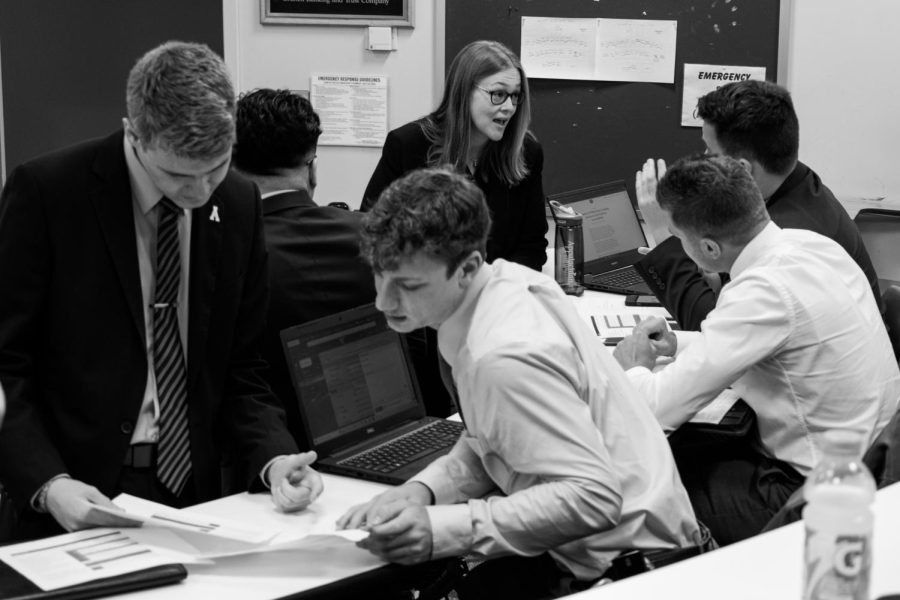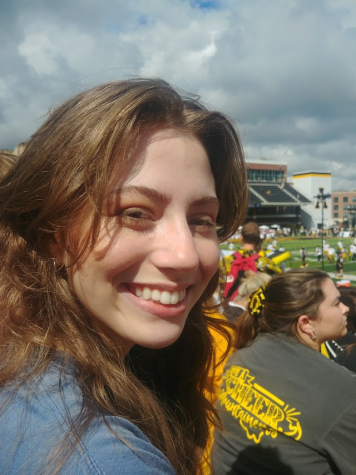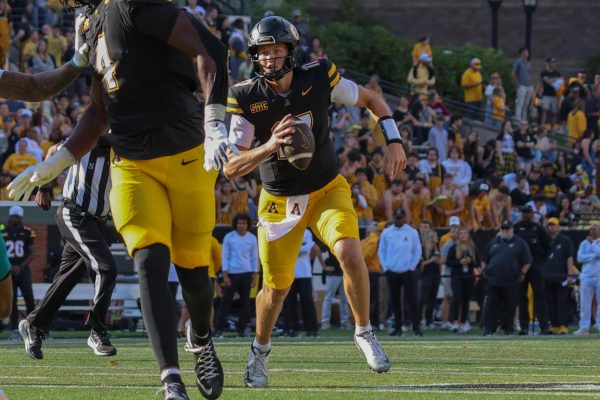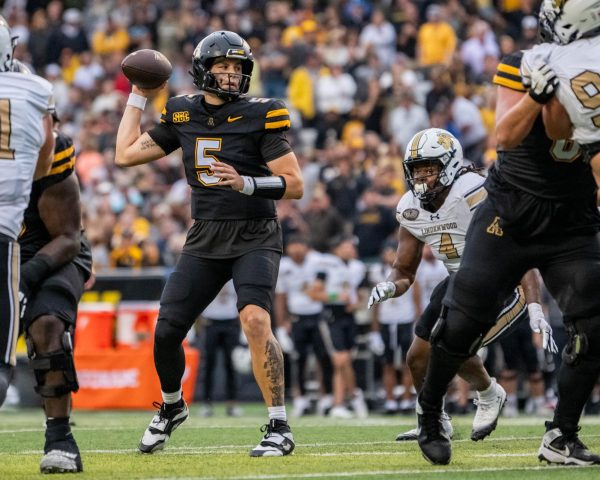Taking stock: Students make trades, investments in business club
Members of the Bowden Investment Group.
October 18, 2022
Senior finance and banking students debate as a fluorescent hum buzzes above them. Dressed in blazers, button downs and ties, discussion of stocks, investments and “market dynamics” make it seem less like a classroom and more like a Wall Street trading floor.
The debate isn’t only about right or wrong decisions, but is a vital part of the Bowden Investment Group, a student managed and faculty advised investment fund in the Walker College of Business.
Made up of 12 senior finance and banking students, Bowden is a competitive student group managing the Bowden Investment Fund, a “growth and income fund” investing solely in equities.
Students in the group make decisions about what equities or financial decisions to make, while also sending out a monthly newsletter to alumni each month, known as the “BIG Update.”
For Bowden members, these investment decisions are crucial. As the group trades with real money associated with the university, investment decisions can significantly impact the value of the Bowden Portfolio.
Bowden isn’t managing small amounts of money. In fact, these students manage roughly $264,950 in cash and investments, according to their portfolio available through their website. As a result, students are encouraged to debate over investments.
“So we have one assignment to be a protagonist. So we’re supporting that stock company. And then we’re antagonists for another company,” said Noah Delucia, a member of Bowden and a senior finance and banking major.
Starting originally as “The Mountaineer Investment Club” in 1994, Bowden was founded by two finance professors, Don Cox and Delbert Goff. They were looking for ways to “provide students with hands-on, real-world investment experience,” according to the Bowden Investment Group website.
After December 1998, Elbert Bowden, another professor in the Walker College of Business, helped the group gain investments by using his name and extensive network for fundraising.
“It started at around $70,000, and now it’s around $300,000 but it’s been 20 years,” said Charlotte Rice, a Bowden equity analyst and senior finance and banking major. “That’s definitely fluctuated a lot this past year because the markets have been crazy.”
Rice joined Bowden not only for the experience of trading with real money, but for the experience of working in a group to decide on what stocks to trade. Even though students are limited on the risk of investments, Rice is excited by the trades which may be considered “risky.”
“I think it’s exciting. I like risky trades. I know it can have real life consequences, but it’s really like a learning opportunity for us,” Rice said. “Which is really cool to have that hands-on exposure, and we can translate that to interviews and jobs.”
Throughout the fall and spring semesters, students pitch stocks to invest in, enabling them to think about why the stock is a good investment.
In doing such, students are encouraged to consider what future forecasts show for the investment and how these stocks work in the real world, Rice said.
For the 2021-22 year, the groups overall performance led to an increase of $9,408 in their portfolio, according to Bowden’s 2021-22 Pride and Performance Review.
For Bowden adviser Shawn Poole, bringing “real world experience to the academic setting of the class” is crucial to the learning experience.
“They’re going to run into things they don’t understand. They’ll see something in the financial statements that doesn’t make sense. They will run into some market dynamics,” Poole said. “And what we’re trying to do is we want them to bring those questions to us. We don’t necessarily spoon feed them the answer, we say, ‘Okay, let’s step back.’”
Poole, who has acted as Bowden’s adviser for the last five years, brings years of experience in both public and private business environments. Brandy Hadley, an associate professor in the Walker College of Business, acts as Bowden’s main adviser while Poole acts as the “color commentary,” or expert analysis, for student decisions.
For Hadley and Poole, the class is less about whether students make the best decisions or grow the portfolio in the biggest way. Instead they believe it’s more about their professional growth.
“They take terrible stocks, and they do really poorly, that’s okay too,” Poole said. “Their grade has nothing to do with how they perform in terms of the stock market performance, and has everything to do with how much do they grow.”
Many apply for this opportunity and only 12 are able to take part. According to Poole, there is a 2:1 ratio for students who are interviewed and those who are accepted.
For David Price, a senior finance and banking major, it was not only the prestige that led him to join Bowden, but a drive to be pushed.
Price said mastering typical classes for Bowden students “comes naturally to them,” but Bowden acts as a challenge where students are being pushed hard to meet expectations.
Dress code is a prominent aspect of the group. Students are required to wear professional attire every day to class, something Price said at first frustrated him. Eventually, Price found the attire had both a professional and psychological effect, making him feel more comfortable in the environment.
“When we dress like this, we feel like professionals. We act as professionals. We have different standards,” Price said.
The unique classroom experience comes from another place, as well. The four credit hour class was created as an effort in the early 2000’s to get students to “that higher level of commitment,” Poole said.
The class is “part club,” but knowing they are going to push students as the year progresses, advisers do not give students their final grade until the end of the spring semester, something that Poole said “creates a little bit more stickiness” to students’ commitment.
“It’s sort of like, ‘Okay, I’m actually taking this for a grade,’ which by the way, we don’t give them the grade until they complete their spring semester,” Poole said. “So they get an incomplete in the fall because we want them to keep hustling.”
The “hustle” of the class is another key aspect. Students are expected to start class during the summer sessions prior to their senior year, and are roughly estimated to spend 20 hours of work on Bowden a week, according to the group’s yearly performance review.
Rice, who started an internship with Bank of America over the summer, said managing expectations was a lot, but “worth it.”
“We’re researching all the time, we’re constantly watching the markets, we have assignments around the clock,” Price said.
Poole compares joining Bowden to attending West Point Military Academy, where former members of Bowden “whether they are 50 years older than you, or 50 years younger than you, are ready to do anything to help you.”
For Poole, the alumni dedication to Bowden is not only unique, but underscores a commitment to the group.
“What’s a little bit unique about Bowden is that most other organizations like that struggle to maintain that alumni network once you graduate,” Poole said.
During spring every year, Bowden hosts an alumni dinner in Charlotte, an event Poole says nearly 100 alumni regularly attend.
“Could be it’s a free meal. A couple of free beers. But I think it’s because of their commitment to, you know, a shared common educational experience,” Poole said.
By the end of the fall semester, Poole estimates that most members of Bowden have already lined up full-time jobs for the coming year, whether it be through their own doing or through their experience at Bowden.
Jonathan Fogle, a senior finance and accounting double major, talked about the community of Bowden. A “Bowden buddy” is a student who has already completed the program paired with an incoming member of BIG. With this system, Fogle says they are “not afraid to reach out to one of them and just say, ‘Hey, do you remember doing this?’”
Fogle advises incoming members to reach out to others that know the group well and to “network” as a way of educating oneself about the organization.
“That’s been the best for me so far in college is just meeting people, talking to them, being open, ready to learn and wanting to do more,” Fogle said.














